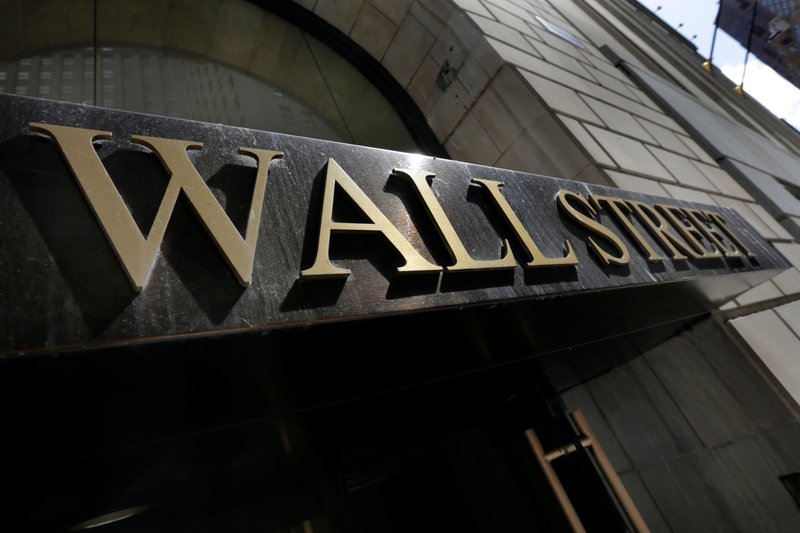
(Photo: AP)
Technology companies are on pace for their second day of sharp losses Thursday, and US stocks are down for the third day in a row. Some of the biggest companies on the market, including Apple, Google parent Alphabet and Facebook, are absorbing some of the largest losses. Energy companies, retailers and banks are also lower.
Investors are waiting to see if the Trump administration will put new tariffs on imports from China, the nation’s largest trading partner. Trade talks with the US’ next-largest trading partner, Canada, are continuing.
KEEPING SCORE: The S&P 500 index slid 20 points, or 0.7 percent, to 2,868 as of 1:10 p.m. Eastern time. The Nasdaq composite fell another 104 points, or 1.3 percent, to 7,890.
The S&P 500 is down 1.1 percent this week after smaller losses Tuesday and Wednesday. The Nasdaq, which has a high concentration of technology companies, has sunk 2.7 percent.
The Dow Jones Industrial Average slipped 12 points, or 0.1 percent, to 25,962. The Russell 20000 index of smaller-company stocks declined 8 points, or 0.5 percent, to 1,719.
TECH SLUMP: Technology companies have outperformed the broader S&P 500 for the past four years and are on track to do that again this year. But over the last two days investors have sold high-flying technology stocks as investors turned more cautious. Apple fell 1.9 percent to $222.49 and Micron Technology shed 8.7 percent to $45.22.
Facebook, Twitter and Alphabet kept sinking as well: Facebook retreated 4 percent to $160.47 while Twitter sank 6.1 percent to $30.75 and Alphabet dipped 2.8 percent to $1,165.10. They each dropped Wednesday after Congressional hearings on search and social media. Facebook and Twitter executives testified, while Alphabet was not represented after it declined to send its CEO.
TRADE UPDATE: The US could put a 25 percent tax on $200 billion in Chinese goods. A public comment period on the proposal expired overnight and media reports have said the tariffs could be announced this week. China has vowed to retaliate.
The US and China have put taxes on $50 billion in imports in the last few months, but larger tariffs would represent a major escalation in their dispute.
Representatives from the US and Canada will continue their talks Thursday after a negotiating session that stretched into Wednesday night. They are discussing a deal that would allow Canada to remain in an updated version of the North American Free Trade Agreement.
NETWORKING: CBS stock jumped after the Wall Street Journal reported that CBS and its parent company are in talks to settle a lawsuit. As part of that settlement, National Amusements would give up on its bid to merge CBS with Viacom, which it also controls.
CBS gained 3.4 percent to $54.77 Viacom dipped 0.4 percent to $29.31.
The Los Angeles Times reported that the talks would also pave the way for the departure of longtime CBS CEO Les Moonves, who was accused in a New Yorker article of sexually harassing six women.
Moonves acknowledged he may have made advances that made some women uncomfortable, but he denied allegations he threatened the careers of some of the women afterward.
EARNINGS: Drone maker AeroVironment added to huge recent gains as it rose 16.9 percent to $102.30 after its second-quarter results surpassed analysts’ forecasts.
Lands’ End fell 11.4 percent to $22.20 after it took a bigger loss than analysts expected, while its sales also fell short of Wall Street projections. The company said sales at Lands’ End Shops inside Sears stores continued to fall sharply.
CRISIS IN EMERGING MARKETS: While the US economy has gained strength this year, investors are worried about the effect of rising interest rates and trade disputes on fast-growing, but often fragile, economies elsewhere. The currencies of Argentina, Turkey and Iran have all hit record lows recently and Venezuela’s currency has lost almost all its value.
While those countries face different problems, the Federal Reserve’s interest rate increases affect all of them by driving up their debt costs and making US assets more attractive. Investors are responding by pulling money out of emerging markets. That’s exposed financial vulnerabilities.
Some investors fear that big losses in some developing markets could ripple out into the global financial system, as they have in the past, notably in the late 1990s, when several Asian countries eventually required financial rescue.
BONDS: Bond prices turned higher. The yield on the 10-year Treasury note fell to 2.88 percent from 2.90 percent.
ENERGY: Oil prices fell for the second day in a row. Benchmark US crude shed 1.6 percent to $67.59 a barrel in New York. Brent crude, used to price international oils, lost 1.6 percent to $76.06 a barrel in London.
CURRENCIES: The dollar dipped to 110.77 yen from 111.51 yen. The euro fell to $1.1621 from $1.1623.
OVERSEAS: Germany’s DAX fell 0.7 percent and in Britain the FTSE 100 lost 0.9 percent. The CAC 40 in France gave up an early gain finished 0.3 percent lower.
Japan’s benchmark Nikkei 225 lost 0.4 percent and the Kospi in South Korea dropped 0.2 percent. Hong Kong’s Hang Seng tumbled 1 percent.


